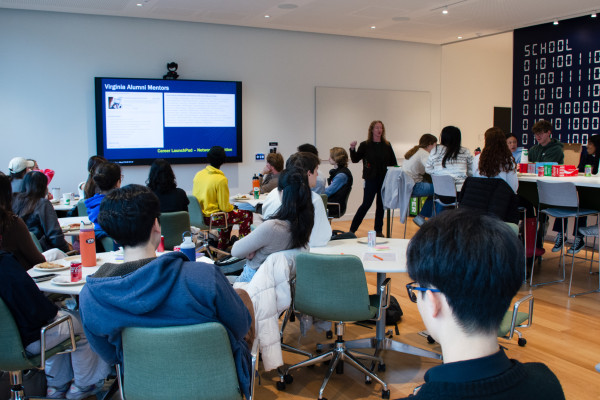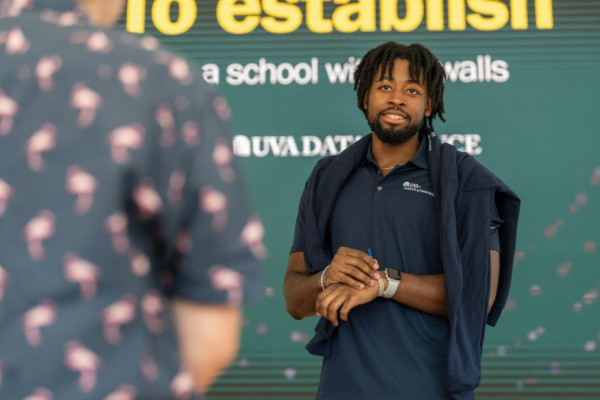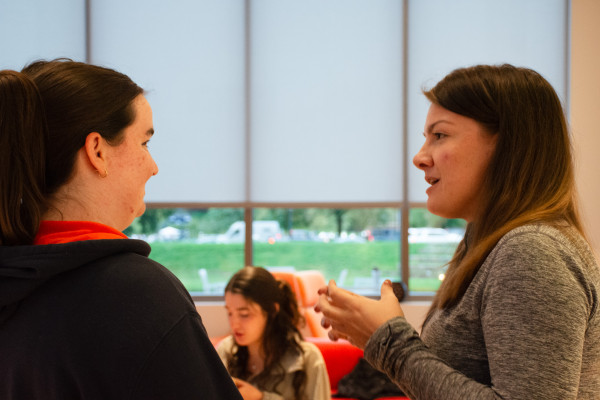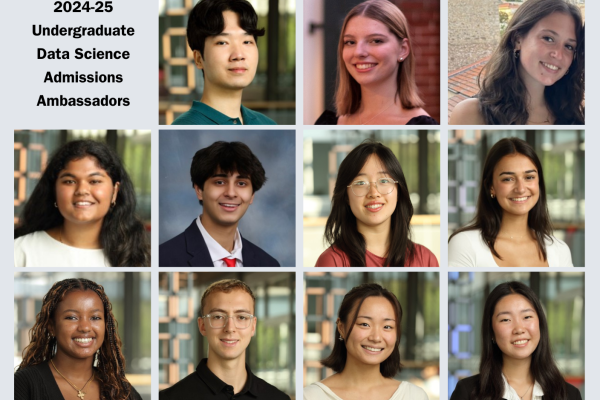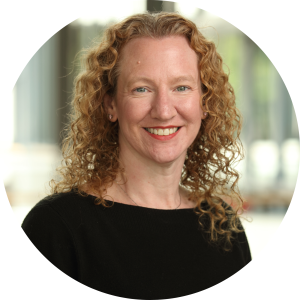
Q&A with Stephanie Joynes, Assistant Director of Career and Professional Development

Stephanie Joynes is the first point of contact for students interested in exploring career development at the University of Virginia School of Data Science. In her role as assistant director, she works with both undergraduate and graduate populations, providing one-on-one counseling, hosting career readiness events, and guiding students through the internship and job search process.
Joynes joined the School in 2024 bringing over a decade of experience in career education, employer relations, and experiential learning at both the undergraduate and graduate levels.
Q: What experience do you have in undergraduate and graduate career counseling, specifically with STEM students?
I am an excellent example of how career paths can be a bit unpredictable. I began my professional journey as an archaeologist specializing in public history, museum ethics, and indigenous cultures at the Smithsonian Institution. This experience instilled in me a deep appreciation for interdisciplinary approaches to STEM and the importance of teaching and applying science in creative and impactful ways. It also ignited my passion for helping others flourish, which has guided my transition into higher education and career education.
In 2013, I joined the College of William & Mary’s Mason School of Business, where I supported MBA, Master of Accounting, and the newly launched Master’s in Business Analytics programs. The reality is that business has become highly dependent on technology for consumer insights, supply chain efficiency, and finance. My experience at W&M was a fantastic introduction to career education and STEM methodology in higher education.
By 2017, as Director of the Ferguson Career Center at Hampden-Sydney College, I supported over 900 liberal arts students while creating a new experiential learning program. Here, I developed a life design framework to guide students in aligning their academic pursuits with meaningful career goals, a practice that has become even more vital in today’s rapidly changing job market. Additionally, working with young adults at this critical time of development and self-awareness was incredibly gratifying. The personal and academic growth that happens in this period, whether they are doing research, interning, studying abroad or in the classroom, can be a life changing experience.
During the COVID-19 pandemic, I saw life design—building a sustainable, meaningful life aligned with personal goals—become a higher priority for students at all stages of their careers. It became clear that career development was not about simply landing a job. It was about creating a holistic plan for the future while asking questions like “Who do I want to be? How do I want to spend my time? What kind of impact do I want to make in the world?” It is rare we make the time to ask ourselves these questions and reflect on our experiences.
Q: How do you approach helping students navigate the job application and interview process?
Navigating the job and internship application process requires a strategic understanding of industry timelines and expectations. For fields like finance, national security, or other competitive industries, students often need to apply for internships a full year in advance. For example, many financial institutions open applications for Summer 2026 internships as early as June 2025, while others may wait until December. It’s crucial for students to track these deadlines and prepare for potential interview schedules, which frequently occur during spring breaks or other pivotal academic periods.
For data science students, highlighting technical skills often matters more than securing traditional internships. There is a “show what you know” culture, which is often through a GitHub profile or the technical interviewing process. Employers want to see that candidates can solve problems, ask insightful questions, and apply technical techniques while communicating results effectively to non-technical audiences. To help students stand out, I encourage them to explore alternatives like faculty-led research projects, micro-internships, or personal projects that demonstrate their abilities. By thinking creatively about gaining experience, students can build both competence and confidence.
Q: How do you tailor advice to meet each student's unique goals and aspirations?
Every student’s journey is unique, and I strive to balance universal career principles with personalized guidance. For all students, we review foundational elements such as resumes, interview strategies, and salary negotiations. From there, I help them delve deeper into industry-specific opportunities, leveraging resources like leadership development programs, affinity groups, and alumni networks to create tailored career plans.
Life design principles play a critical role in our conversations. I encourage students to reflect on questions like: Where do I want to live? What kind of lifestyle aligns with my financial and personal goals? How can I create a meaningful and sustainable career? These discussions often uncover priorities beyond the workplace, such as intellectual fulfillment or work-life balance, helping students create fulfilling career paths, while being mindful of the life they intend to build for themselves.
At the same time, I always like to remind everyone that life can change quickly and being adaptable to those changes is incredibly important. At certain times of your life, your finances and intellectual stimulation are your top priority, while at other stages of life, your family needs your attention. Conscientiously balancing and adjusting these aspects as needed is a skill, which includes recognizing how a career positively or negatively impacts your life.
Q: What specific career paths and specializations are B.S. in Data Science (BSDS) students well-positioned to pursue, and how does the curriculum align with industry demands?
The BSDS program provides a solid foundation for diverse career paths, catering to students with varied motivations and strengths. Some are drawn to the technical rigor of data science, while others excel in visual storytelling and communication. This diversity in content enriches the learning environment, fostering collaboration and innovation amongst the cohort and community at the School of Data Science.
Data science skills are highly adaptable and in demand across industries. Whether enhancing customer experiences at Spotify, optimizing supply chains at Amazon, or advancing healthcare research, data science offers unparalleled opportunities to make a real-world impact. The BSDS curriculum aligns with these demands by equipping students with technical expertise and interdisciplinary perspectives, preparing them to succeed in fields ranging from technology to sustainability.
Additionally, we work collaboratively with the UVA Career Center to build relationships with employers seeking data science expertise. Whether they are large international consulting firms or smaller regional companies, the quality of a UVA degree ensures that employers are hiring candidates with strong technical, communication, and leadership skills. This gives students confidence in finding opportunities that align with their career aspirations.
Students can pursue a variety of options, including leadership development programs, innovative start-ups, and entry-level positions. Our goal is to connect them with organizations that are the right fit for their personal goals, professional growth, and future success. We also like to keep in mind that success can be defined in so many ways, and that’s where students can feel empowered in their life design journey.
Q: With such a diverse range of career paths available in data science, what tools and resources help BSDS students find the best fit for their interests and skills?
The rapid evolution of data science requires students to adopt a mindset of lifelong learning. To support them without overwhelming them, we provide strategic tools and resources, such as UVA Career Center’s PathwayU, which helps students identify their natural talents and connect them to career options. For those further along in their career planning, we offer employer information sessions, career advising, and workshops tailored to their interests.
Signature events like the Data and Analytics Career Fairs and Datapalooza provide invaluable opportunities for networking and learning about industry trends. Additionally, our virtual Career Launchpad course guides students through the fundamentals of job searching, from resume writing to salary negotiation, ensuring they feel prepared and confident. Additionally, there are always new internships, jobs, and resources posted in Handshake and are available when students need them. We also send out a weekly Career Corner newsletter to ensure students are up to date on events, conferences, and tools that can help build their knowledge of new developments in data science.
Q: Given the projected growth in data science jobs, what specific industries or sectors are expected to see the highest demand for data scientists in the next five years?
We are anticipating the hiring needs of data scientists to continue to be robust in the next five years, with solid salaries and growth opportunities. While we all know the tech giants of the world – Google, Meta, and Amazon – they do a small share of the hiring. We encourage students to explore mid to small companies, who may hire for more specific big data roles and are more on demand as they attempt to stay competitive. We also see a lot of hiring through consulting firms such as Deloitte, Booz Allan Hamilton, and Accenture to support various organizations with specific projects.
Technology and healthcare continue to lead as high-demand sectors for data scientists. Technology shapes every aspect of our modern lives, offering endless opportunities for creative and entrepreneurial minds. Healthcare, reinforced by advancements during the COVID-19 pandemic, relies on data science for innovations in disease tracking, drug research, and hospital efficiency. These applications demonstrate the interdisciplinary nature of data science, blending social sciences, biology, and business to drive better patient health outcomes.
At the same time, we are also seeing growth in the finance industry as data science is used for fraud detection, risk management, and operational efficiency. On a more personal level, these skills are also supporting clients with a more customized experience, including regulatory compliance, and helping investors make socially responsible investment decisions.
It is also important to recognize that due to our proximity to Washington, D.C. as well as the well-established consulting firms and agencies in the region, national security is another industry that will require a new generation of technical and ethical data science professionals.
As a society, we are becoming more comfortable with applying these technologies while also considering ethics and moral implications of integrating them into our daily lives. I enthusiastically encourage students to consider working in public policy, so we are conscientiously navigating these waters with boundaries and thoughtfulness of their future impact.
There is no better time than now to ask questions about the philosophical and legal implications of what is being created now, particularly how it impacts issues in privacy, ethics, accountability, equity, and the potential for bias or harm. The School of Data Science requires our students to consider these issues so when they are in positions of leadership, they are approaching these challenges with transparency, awareness, and inclusivity.
Q: How does the Career Services team collaborate with industry partners to identify emerging job and internship opportunities, and what strategies do you employ to help them develop strong professional networks?
Our team actively collaborates with industry partners and UVA alumni to identify emerging opportunities for students. These partnerships provide insights into trends and connect students to internships and jobs. To help students build strong professional networks, we promote engagement with alumni through programs like the Virginia Alumni Mentor network and guide them in leveraging LinkedIn and other platforms effectively. Personal connections often open doors to unexpected opportunities, and we encourage students to start small, building confidence as they grow their networks.
We also recognize that for undergraduates the concept of networking is new, so we have provided workshops to build these social skills and learn some of the unspoken cultural rules. Many students are so concerned about doing it all correctly that they may be frozen or avoid these interactions completely. But when we point out they have been building friendships and relationships their whole lives, it can be less intimidating. The entire UVA community wants these students to succeed and enjoy helping in so many ways. Our faculty, staff and alumni are the biggest cheerleaders of our students! Sometimes that may look like a resume review, an introduction, or simply answering questions about what a day as a data scientist looks like.
UVA has incredible Career Center support across Grounds to help students learn how to navigate careers fairs, create a personal pitch to recruiters, and how to effectively follow up with alumni after a career conversation over Zoom or coffee. We try to humanize these interactions because in the end, we all want to help students succeed.
Q: What are common challenges undergraduate data science students face in their job search and what advice do you give to overcome these challenges?
A common challenge for both undergraduate and graduate students is managing anxiety about the job search. To address this, we focus on building confidence through preparation. Mock interviews, resume reviews, and skill-building workshops help students feel ready to showcase their strengths. Additionally, we emphasize the importance of reflection and adaptability, encouraging students to view setbacks as opportunities for growth.
Another factor is that our students are overachievers, who have typically been some of the best students in the room. They are engaged leaders, self-directed learners, and can often be competitive. However, job searches usually involve a lot of rejection and redirection which can be a new challenge to someone who has never experienced it. While a class may have a syllabus, timeline, clear expectations and a clear outcome, the job search is not as linear or simple. Building resilience while maintaining motivation is an unexpected part of the process.
We are continually destroying the stereotype of what a data scientist should look like. We have students at all ages and stages of their careers, and from a variety of different disciplines and talents. Yet, I see students struggle to identify with the title “data scientist.” If you are working with data, finding trends, asking questions, and making decisions based on your findings… you are a data scientist. You are both wanted and needed here. It is a very welcoming and supportive community!
Q: What specific programming does the career team offer in support of BSDS students?
The Accelerate program was designed to address the unique needs of BSDS students, covering topics like imposter syndrome, stress management, academic advising, and post-graduation planning. By collaborating with initiatives like Wahoo Well, we help students navigate both the academic and personal challenges of their undergraduate experience.
We also provide opportunities for career exploration, so students have time to learn about how data science is used in different industries. While our main UVA Career Center can support students interested in creative, business, or technology communities, we partner with our colleagues across Grounds, so students learn how to apply their data science in unique ways. This may be in fields that never would have occurred to students like architecture, urban planning, or media.
We also provide workshops, meet-ups, and symposiums so students can network with those working in the field. These experiences allow students to find answers they cannot find on a website or through AI. Real people with authentic stories of the challenges and growth that happen working in an ever-changing world are what many students seek. Hearing from someone who has been through the coursework, job search, interview, and hiring process can be incredibly reassuring to a young person.
This comprehensive approach ensures students are equipped to tackle the big questions about life after UVA with confidence and clarity knowing they have given themselves time to investigate and prepare for their chosen career path.
Q: How do School of Data Science alumni support current students?
Alumni play a vital role in supporting current students. Programs like the Virginia Alumni Mentor network allow students to seek advice and build connections in a more accessible and manageable way. These relationships often evolve into mentorships, providing guidance and opening doors to career opportunities. By fostering a culture of alumni engagement, we help students tap into a valuable network that enhances their career prospects.
We also encourage students to take advantage of networking events and meetups not just in the Charlottesville area, but also in Northern Virginia and Richmond. These are great hot spots to connect with our alumni working at fantastic companies and organizations.
Our alumni are in the field doing the work every day and know what skills are needed in the workplace. Their real-life experiences and perspectives are invaluable to students hoping to enter this field. More importantly, they have experienced what it is to be a UVA student and have a unique understanding of the challenges of transitioning from a student to an employee who is building their life as a young adult. Mentorship is gratifying for both parties, and our alumni approach it with compassion and understanding.
